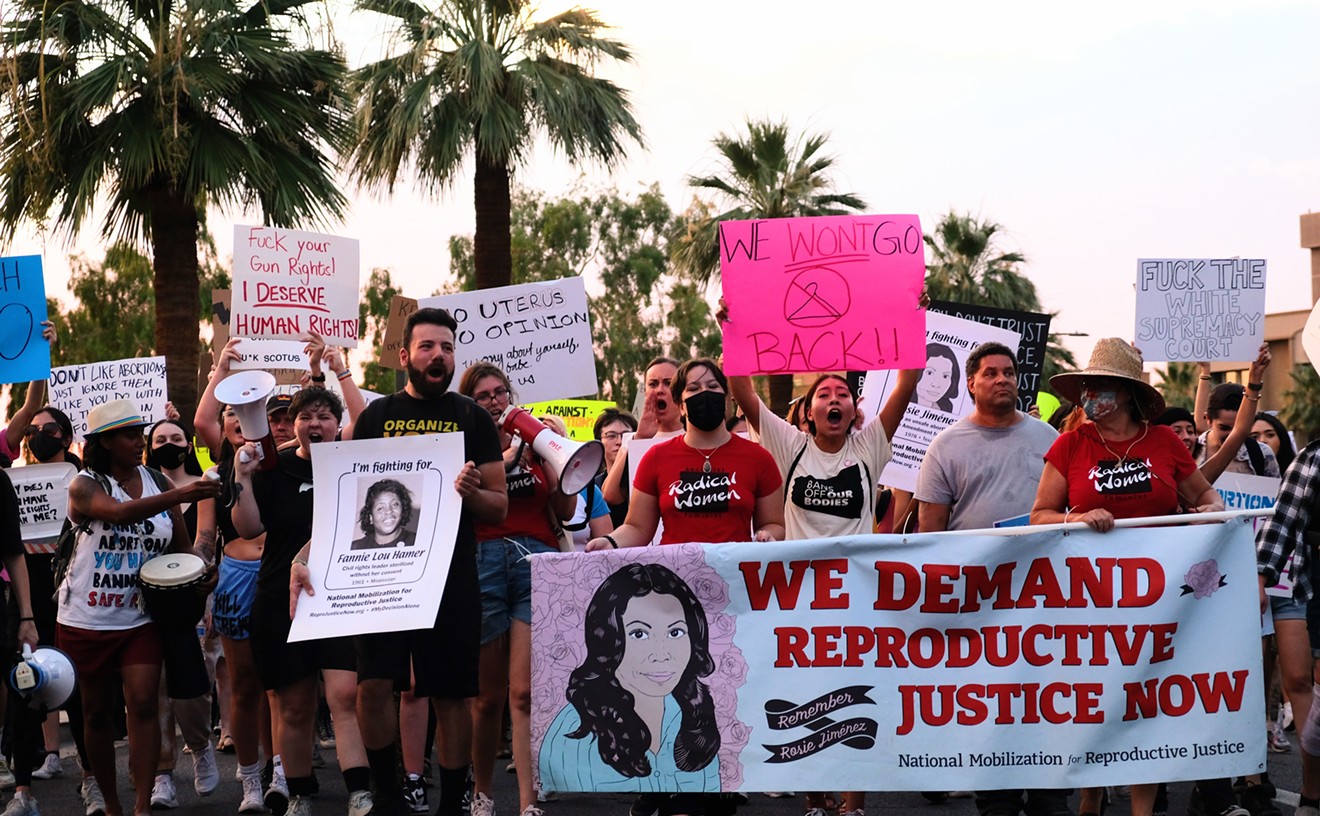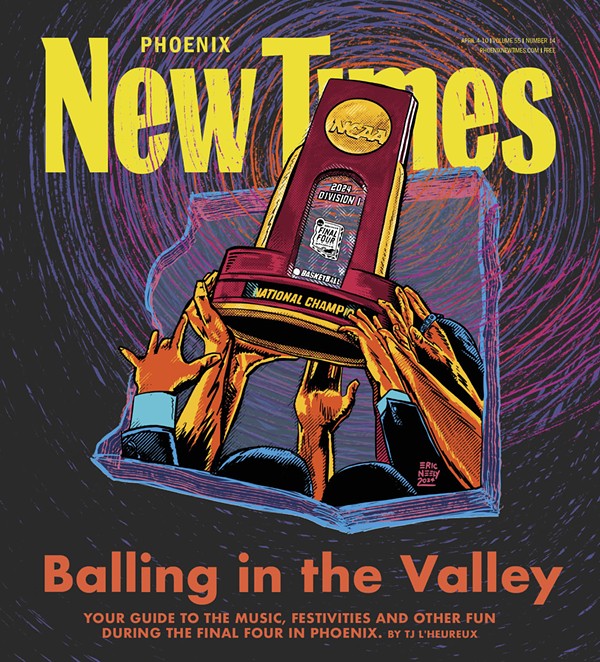Curtis Hennig arrived at Saguaro High in Scottsdale midway during his junior year, a transfer student from Minnesota who quickly made it known he wanted to play football, wrestle and raise hell. He is remembered by his athlete friends as a friendly, fun-loving kid who loved to roughhouse.
When your dad is a pro wrestler nicknamed "The Ax" and you've got a full-scale wrestling ring parked in your garage at home, personality probably comes with the territory. "He was everybody's friend," says Scott Troilo, an offensive end who worked out opposite Hennig during football practice. "If he was there for a couple of years, he could've been class president."
Bob Jenkins, a running back on the football team and state champion wrestler, was Hennig's practice partner in the wrestling room. "I remember he would drive around the parking lot like a maniac," Jenkins says. "He had little regard for whatever was in his way. His life was reckless abandon." Steve Smith played linebacker behind Hennig's defensive end on the Sabercat football team. "He always wanted to body-slam people," Smith says. "Every second you were around the guy, he wanted to body-slam you."
After prom and graduation, Hennig moved back to the Midwest. His friends lost touch. Troilo, Jenkins, and Smith went on to college and careers. Hennig went on to wrestle Hulk Hogan.
In the years since the Saguaro High Class of '76 broke up, Curt Hennig has become Mr. Perfect, one of the stars of the World Wrestling Federation. A "heel" in pro-wrestling parlance, he is a frequent opponent of WWF champion and genuine pop superstar Hogan, and one of the federation's biggest draws.
Like the rest of the new breed of pro wrestlers, Mr. Perfect doesn't look like a beer-bellied, ex-truck driver in tights. His shtick is the ultimate jock bully. He's a tanned, strutting stud in long curly blond hair. Mr. Perfect is known to millions of wrestling fans, and disliked by most of them. THE HENNIG FAMILY moved to Scottsdale from Minnesota in 1975. Curt's dad, Larry "The Ax" Hennig, was a pro wrestler who wanted to mine the Arizona market for wrestling dollars. It was his hope that Phoenix could be made a regular stop on a regional wrestling circuit, and that local matches would sell to local TV. Though still wrestling, The Ax wanted to get further into the promotion end of things. "I thought it would be a good place to do it," says The Ax from the office of Larry Hennig Realty in Elk River, Minnesota, a suburb of Minneapolis. "But the people who were there before I got there hadn't paid their bills. I tried to get on the independent channel there, Channel 5, but never made it. "I think the interest was there, but I couldn't get the exposure. We had it up on some religious channel on UHF, which wasn't being used very much. I couldn't get it out to enough homes."
After a couple of years, Larry gave up on the Valley and left to wrestle elsewhere. The family moved back to Minnesota, where Curt played junior college football well enough to get a scholarship offer from the University of Nevada-Las Vegas. When a knee injury ended Curt's gridiron career, he set out as a wrestler. In several different regions, Curt and his father had success as a father-son tag team. According to Larry, the duo held the Pacific Coast Tag-Team Championship--whatever that is--for a time. "We drew a lot of money together," Larry says. "It was good."
As a solo act, Curt Hennig bounced around the small-time wrestling world, gradually making a name for himself, though it would be years before that name would be Mr. Perfect. Eventually he made his way to the American Wrestling Association, a promotional organization now considered to be positioned one very long step below the WWF in prestige. Hennig became champion of that league, then accepted an offer to join the WWF. THE WORLD WRESTLING Federation, ruled by Vince McMahon, rules professional wrestling. In the early 1980s, McMahon raided smaller, regional wrestling alliances to form his first stable of WWF wrestlers. McMahon made Hulk Hogan his first major star. Hogan has since made McMahon a very major amount of money. WWF broadcasts are carried on cable, independent and network television outlets. The touring WWF wrestling cards draw thousands to arenas like Veterans' Memorial Coliseum, where a wrestling show was held last month. By consolidating the best talent and sharpening the athletes' already cartoon-like characters, McMahon made pro wrestling into one of the runaway promotional success stories of the decade. By the time Curt Hennig joined the WWF in 1988, McMahon was already staging semiannual wrestling events on closed-circuit TV, marketing video cassettes of the matches, selling tee shirts, headbands and dolls. The Mr. Perfect character was introduced to wrestling fans over the period of about a year. One week, Hennig would be shown whipping an opponent at Ping-Pong. The next week he'd be seen swishing three-pointers on a basketball court. The next he'd be running a rack of balls on a pool table. He could do it all. Curt Hennig was, well, Mr. Perfect. Plus, he could wrestle. "There are several hundred wrestlers in the country, and they all have certain talents, certain things they're good at," says Dave Meltzer, publisher of the Wrestling Observer Newsletter, an unauthorized-by-the-WWF journal that covers the pro-wrestling business. "Most wrestlers would rate Curt as one of the best--many would say the best--in wrestling."
Meltzer, who also writes a weekly pro-wrestling column for the new sports publication called The National, reports on the game from a friendly skeptic's perspective. "The best wrestler is the guy who makes the match look good--he's good at making an opponent look better in the ring," Meltzer says. "Curt can work so fast, the other guy can stand still and still look good. Curt can create action for a long time because he's got so much stamina. The wrestlers I talk to really respect him as far as ability goes."
Last year, a feud was staged between Mr. Perfect and Hogan. On one of the WWF's network broadcasts, Mr. Perfect smashed Hogan's coveted championship belt. So for the past several months, Mr. Perfect has been matched against Hulk Hogan in the headlining bout on many road cards. "Curt makes Hulk Hogan look better than Hulk Hogan looks against other wrestlers," Meltzer says. Because of his comparatively new prominence among pro-wrestling's elite, Mr. Perfect has been mentioned as one of the possible successors to Hogan, the sport's long-time champ. Hogan, hugely popular with children, reportedly has been talking with the Disney studios about a rich movie deal that almost surely would require time away from the ring. If and when Hogan is replaced as long-term champion and star of the WWF, several charismatic characters are waiting in the wings. Meltzer has speculated in his newsletter that McMahon seems to be grooming The Ultimate Warrior as Hogan's eventual replacement in the spotlight. Another possible contender is Randy "The Macho King" Savage. In fact, Hogan has well-scripted feuds boiling against both wrestlers. He and The Ultimate Warrior are scheduled to wrestle in the upcoming Wrestlemania extravaganza April 1 in the Toronto Skydome. If it is written that Mr. Perfect is to be WWF's champion someday, it's certainly not going to happen before April Fool's Day. Still, for wrestling fans and Curt Hennig's old friends, the question remains: Can the rowdy kid from Minnesota (by way of Saguaro High) take the belt away from Hulkamania's balding, bulked-out superstar? "In this case, I don't expect it to happen," Meltzer says, adding that "it was just Curt's time" to be paired against Hogan during the past months. "The WWF feeds guys to Hogan. Each guy gets a couple of months, then Hogan gets a new opponent. The villains are basically fed to the good guys."
Meltzer predicts that Mr. Perfect's next regular foil will be Brutus Beefcake. The two titans are scheduled to clash at Wrestlemania, a match that could be used to set up a long-running exchange between the two. PRO WRESTLING'S CLOSEST relative is the wonderfully seedy world of the carny. In the WWF, bad guys are "heels." Good guys are "baby-faces." Anonymous under-card wrestlers, or wrestlers who are known for being reliable losers, are called "jobbers." Paying customers are "marks." The WWF has its own taping equipment (which follows the talent around the country in big blue trucks), its own magazines, its own interviewers--even its own talk shows. Mr. Perfect and his opponents are perpetually hoarse, because of the endless WWF-generated shriekfest "interviews" aimed at potential customers in the next dozen towns along the wrestling road. Since Vince McMahon's troops manufacture and control their own hokey marketing--the federation manufactures everything about itself--company publicists are interested in local ink only if it comes in advance of a specific event. Unless a reporter is interested in helping to sell tickets, a brief audience with one of the WWF's star attractions is a rarity. And it's practically impossible to ring up your favorite wrestler just to gab. After several days of fruitless phone tag played across offices, arenas and hotels in Phoenix, Tucson, Nashville and the WWF's Connecticut headquarters, New Times finally reached Mr. Perfect at a hotel near the Nashville airport. His voice was rough, due partly to daylong "interview" sessions, partly to a late-night encounter with country singer David Alan Coe, an old friend.
Even when groggy from road lag and self-imposed sleep deprivation, World Wrestling Federation star Mr. Perfect stays in character. "I've always been a good athlete at everything," he rasps. "I think that's my gimmick, or whatever you want to call it. It's a new look that I bring into the WWF. I don't think they've had an all-around athlete who can do all these things. The world of wrestling has given me the opportunity to show some of my real colors."
IT'S DOUBTFUL THAT Curt Hennig's success in the larger-than-life world of professional wrestling is much of a surprise to the people who knew him at Saguaro High. His classmates remember him as the football team's "jokester," the guy who could bust up a huddle or a team meeting by launching into a Walter Brennan imitation. According to Scott Troilo, he and Hennig used to stage fake fights around campus, just to get attention. Sometimes the fake brawls would take place in the lunch room, sometimes in more academic settings. "We were in a class once, Child Development or something," Troilo says. "We started by giving each other mean looks. Then he said, `Troilo, you piece of shit,' and pushed me. Then he took a mock swing, and we started rolling over tables." As Troilo remembers it, that stunt cost them a trip to the principal's office.
Another of Hennig's running buddies, Bob Jenkins, recalls similar rowdy times. "He was really good at fake-hitting you," Jenkins says. "He could fake a punch and make it sound real."
In fact, Jenkins says, the boys often went out at night looking for fights. Hennig would wear red, knee-high wrestling boots borrowed from his father on such occasions, hoping that the outrageous footwear would prompt flippant comment from some unsuspecting tough guy. "Curt made me drive while he stuck his boots out the window," Jenkins says. "Him and me had some kind of chemistry. We just clicked." On the Saguaro wrestling team, Jenkins was the undisputed star. Wrestling at 191 pounds, Jenkins was a state and national champion in his weight class. He and Hennig, who wrestled in a lower weight class, were sparring partners in practice. In the off-season, the two would head to the Hennig family garage, where they'd throw each other off the ropes and practice melodramatic flying drop-kicks.
"He was a little-bit-above-average high school wrestler," Jenkins says. "He lost a lot of his matches because of his temper. He would lose his composure. He had his dad's temper. He'd rather fight than wrestle."
Despite the rough stuff (or perhaps because of it), Hennig is fondly remembered by his old football coach Bob Keller, now Saguaro's athletic director. "Curt was very aggressive," says Keller, who coached the Sabercats to the state semifinals during Hennig's senior season. "His big thing as defensive end was his quickness. He wasn't overly big by any means. He was just fierce."
Keller saw Hennig wrestle Hogan last month at the Coliseum. Keller's status with his current students increased a notch when word got out that he had once coached Mr. Perfect. "I said something about it to my sixth-hour class," Keller says. "I was dressed up a little bit, and they asked me what I was doing. I said I was going down to watch Curt Hennig work on the Hulkster, and immediately fifteen guys said, `Oh, yeah!' They know everything about everything. I mean, these guys watch this stuff, they're really interested."
Keller says his students admire the pro wrestlers not for their hambone histrionics but for their carefully sculpted physiques. The outrageous body-builder look is something relatively new to pro wrestling, observer Dave Meltzer says, and has a great deal to do with the game's appeal to young people today. Old-time wrestlers tended to look as if they were smuggling beer kegs around under their warm-up jackets. Meltzer says the chiseled- from-granite body is favored by McMahon and shows Hulk Hogan's overwhelming influence on the business. "Hulk Hogan was the first muscular giant to come into wrestling," Meltzer says. "They wanted a monster. Hogan was the monster. Hogan was in the right place at the right time. He has super, super charisma. And because of his popularity, because of the money he made, everybody started gobbling those steroids."
Meltzer considers this subject to be pro wrestling's great unspoken shame. The real sporting world has only recently begun to deal with the use of muscle-building anabolic steroids, which are said to have negative long-term side effects. No such higher consciousness is apparent in pro wrestling. "Steroid use in pro wrestling is, I would say, as high if not higher than any other sport, unless you consider body building and powerlifting a sport," says Meltzer, whose newsletter has coined the derisive nickname "The Anabolic Warrior" for one of the WWF's biggest stars. "It's more than professional football, a lot more. If it were covered like pro football, people would be aghast at what goes on. Wrestling is not covered in depth, and it's such a surrealistic world. The media doesn't scrutinize wrestling. The sports people don't want to consider it a sport, and the entertainment people don't want to consider it entertainment.
"There are some wrestlers that I know that are going to take steroids, no matter what. They'd be using steroids if they weren't in wrestling. I don't blame wrestling for that. There are people at every gym who don't body-build or wrestle who take steroids because they want to look big. Most of the wrestlers come from that environment. "If wrestlers don't take steroids, they will look physically deficient. No matter how hard you lift, you can't stand next to the freaks that wrestling now has. It's the guys who don't want to and still do that are sad."
Mr. Perfect doesn't deny that steroids are an issue in pro wrestling. "I think steroids are an issue in every pro sport," he says. "In the WWF people are buying bodies. They're buying the look. You have some users and some nonusers. Fortunately, I had a father who was 6-4 and 240 pounds. Genetically, I've never had to take 'em. I think my father would beat the shit out of me if I did.
"I've had doctors tell me I'm a freak of nature. I've never done sit-ups, I've never lifted heavy weights. I've just got an incredible metabolism."
FOR THE COUNTRY'S top wrestling talent--and Curt Hennig certainly is among the WWF's top handful of attractions--wrestling can be lucrative. Hulk Hogan's income is estimated at more than $1 million a year. A lesser wrestler's pay is usually based on attendance averages at road shows, and top-of-the-card names do better than the "jobbers" who work preliminary matches. "It's a tough life, but guys who are very, very good and very, very lucky--and you need both--can make a lot of money," says Meltzer. He estimates that most of the WWF's top dogs pull in more than $200,000 a year.
Mr. Perfect, who's 31, still has plenty of earning potential left. "The good ones peak at 35 or 36," Meltzer says. "He's never going to be a Hulk Hogan as far as moneymaking, but the great ones can still be on top in their mid-thirties if they avoid injury."
Despite the considerable wear and tear on their bodies, much of it apparently self-inflicted these days, many wrestlers seem to hang on longer than they should. "They seem to never get out, because they seem to get addicted to the spotlight," Meltzer says. "In a traditional sport, after a year or two of having a low batting average, you're sort of told you can't do it anymore. In wrestling you don't have a batting average."
Mr. Perfect says he sees the end in sight. "As a second-generation wrestler, I've seen all the great stars, guys who made $10 million over a career, and they don't have anything when they're done," he says. "Wrestlers are self-employed, and they don't have benefits, so if they get hurt, they're on their own.
"I'm gonna retire when I'm 35, no matter what."
THE GUYS WHO HUNG with Mr. Perfect as kids say Curt Hennig--Mr. Popularity in high school--is unaffected by WWF stardom. Mr. Perfect's family life is not a topic for discussion in interviews, but his friends here report they get Christmas cards from him every year that feature a photo of a wife and several children. "Curt has not changed a bit since high school," says Troilo, adding that he talks by telephone with his old buddy every couple of weeks. "He's bigger and smarter, but his growth hasn't affected his demeanor."
Jenkins keeps in touch, too. One recent day, when the WWF road show was making its way through Southern California, the two former mat men got together to trade life stories. As expected, talk eventually turned to moves and holds. According to Jenkins, Hennig was on the lookout for a new signature move, something to replace his dreaded "perfect-plex," which he uses to finish off opponents. "It's good, but it's old," Hennig told Jenkins. "Show me a new move." "I started screwing around with him," Jenkins says. "I could still whip his ass, no problem."
end part 2 of 2
"Every second you were around the guy, he wanted to body-slam you."
Mr. Perfect is known to millions of wrestling fans, and disliked by most of them.
"Curt makes Hulk Hogan look better than Hulk Hogan looks against other wrestlers."
Can the rowdy kid from Minnesota (by way of Saguaro High) take the belt away from Hulkamania's balding, bulked-out superstar?
"Curt made me drive while he stuck his boots out the window. Him and me had some kind of chemistry. We just clicked."
Keller's status with his current students increased a notch when word got out that he had once coached Mr. Perfect.
"In the WWF people are buying bodies. They're buying the look.










